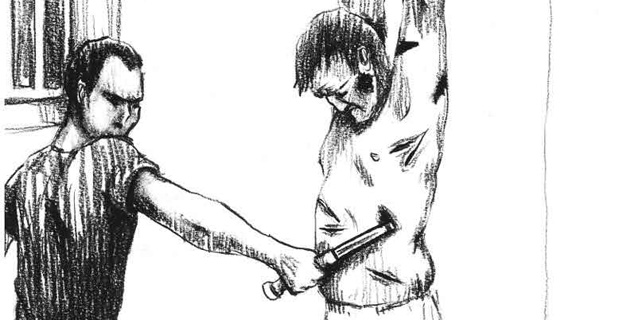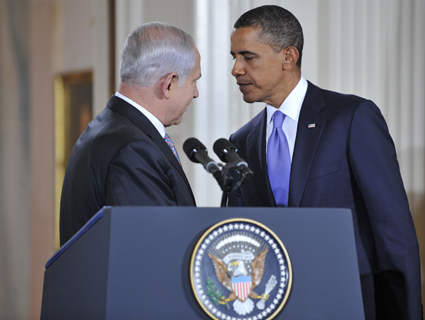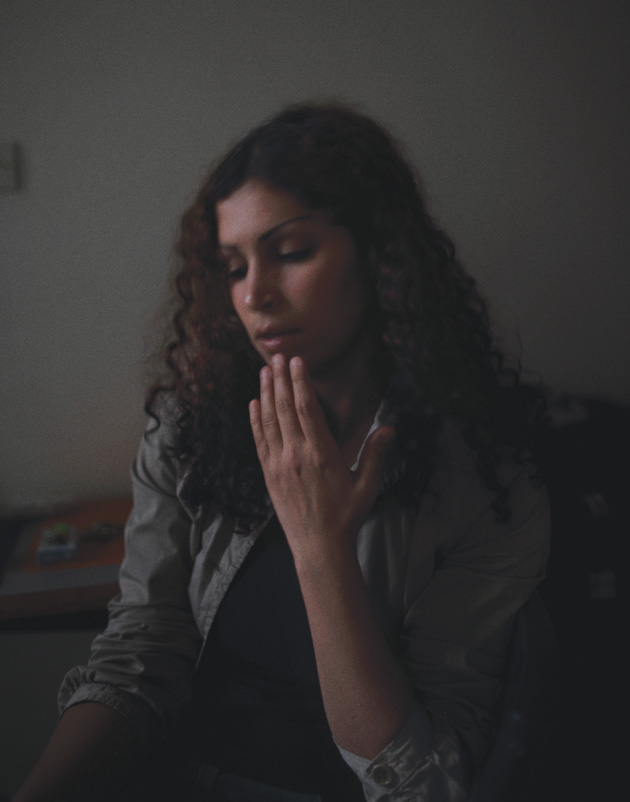
There was a circle of friends who lived on the southern edge of Damascus in a district called Yarmouk. They were artists, mainly. Actors, filmmakers, photographers, and musicians. Their neighborhood was a maze of alleys and tightly packed, four-story cement block buildings, and it smelled faintly sweet and dusty. On the roofs, the friends would sometimes sit to smoke cigarettes and look toward a horizon filled with rusted satellite dishes and rooftop water tanks. They could see laundry hung out of windows and rugs draped over balconies. In the evenings, they could watch men flying pigeons from their rooftop coops. Off to the west, they could see Mount Hermon, and if it was winter, there would be snow on it.
There were many sounds: children playing soccer in the alleys, men advertising the watermelons they pushed around on wooden carts, stereo-projected voices calling the devout to prayer. In between the honking of horns and vrooming of motorcycles there were the coos of pigeons, the dings of bicycle bells, the gossip of neighbors.
The scent of food always beckoned on Yarmouk Street: warm, cheese-filled pastries dripping with sugary syrup; the best falafel in Damascus; pizzalike things called fata’ir that came in 10 different varieties and cast tantalizing scents a block away. People were poor in Yarmouk, more so than in most of Damascus, but there was always much food. Many had large bellies.
Who then could conceive that imams would one day announce it was no longer religiously taboo to eat cats or donkeys? Women and children couldn’t yet dream they would soon be sifting through the grass for edible weeds. No one could imagine that on a street outside some apartments, there would be a little pile of cat heads next to men and children flaying the mangy animals and boiling them in a pot.
From the edge of Yarmouk, above the distant buildings miles away, the friends could see the house of Bashar al-Assad, sitting high up on a hill. They did not like him. People they knew had gone to prison for suggesting an alternative political vision, however subtly. They felt so choked by his secret police that when someone they didn’t know showed up at a party, they regarded him with suspicion and measured their words. Sharing a cigarette laced with hashish at the edge of Yarmouk, they would joke about the eyes of the dictator being upon them, and they would laugh cynically.
Among this group of friends were Hassan and Waed. (I’m withholding their last names to protect their families.) Hassan was a budding actor and playwright, and Waed had been a student of English literature. They were a handsome couple, both in their mid-20s. Waed was reserved compared to most of the group, but sharp and self-possessed, with gentle eyes and long, wavy hair. Hassan had a long face, a head of shiny black curls, and dense, dark eyebrows that arched high when he became excited. He loved to joke about things—ridiculous things, like the schlocky keyboard players who perform at weddings, and serious things, like how his grandparents’ honeymoon in 1948 consisted of being driven out of their homes in Palestine—”life’s a bitch”—and coming to Syria.
Their friends were refugees, mostly, as was nearly a third of the population of Yarmouk. They had been born in Syria and most of their parents had, too, but they were not citizens. The Syrian regime, like other Arab governments, held that naturalizing them would absolve Israel of its responsibility for the Palestinians it displaced. Refugees came to Yarmouk in waves, first after the mass expulsion in 1948, then in 1967, when Israel occupied the West Bank and Gaza. Yarmouk became the largest Palestinian refugee camp in Syria. Poor Syrians eventually moved in and outnumbered the Palestinians, but it remained known as “the camp.” In less than a square mile, Yarmouk contained an estimated half-million people, nearly 13 times the density of Manhattan.
As places to be a refugee went, it was a good one. In Syria, unlike neighboring Lebanon, Palestinians could do most of the things citizens could, including going to college. Waed and her sister were the first women in their family to attend university, at the urging of their illiterate grandmother. The school was two hours north of Damascus, and Waed had to travel there alone every week. She would leave on Sunday and come back Friday morning. Or so her parents thought.
They didn’t know that Waed would actually come back to the capital on Thursdays, as soon as she finished classes. Hassan would meet her at the bus station and they would go to the city’s main park, one of the only green parts of Damascus, where it smelled like eucalyptus and there were gushing fountains and winding rows of carnations. They would stroll around, snack on nuts, and talk for hours on the park benches. Once it was dark enough to move around unrecognized, they’d return to Yarmouk. There, they had a secret place. At the top of Hassan’s four-story building there was a little cement-walled room with no doors. Hassan and Waed would wait in the stairwell, sometimes for hours, until Hassan’s mom closed the door of her apartment for the night. Then they’d sneak up to the little room. The next morning, Waed would sneak out and go home, pretending she’d just come off the bus.
Years later, the two became engaged. Waed dropped out of college to get work so they could save up for an apartment and get married. The after-school trysts were over, but Thursday nights remained sacred for them. That’s when they would go to the weekly salons put on by Mazen Rabia, a mentor of sorts for their group. It was at these gatherings, while living in Yarmouk in 2009, that I first met Waed and Hassan.
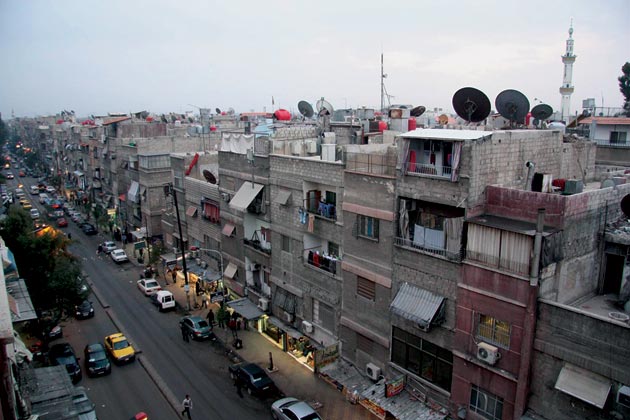
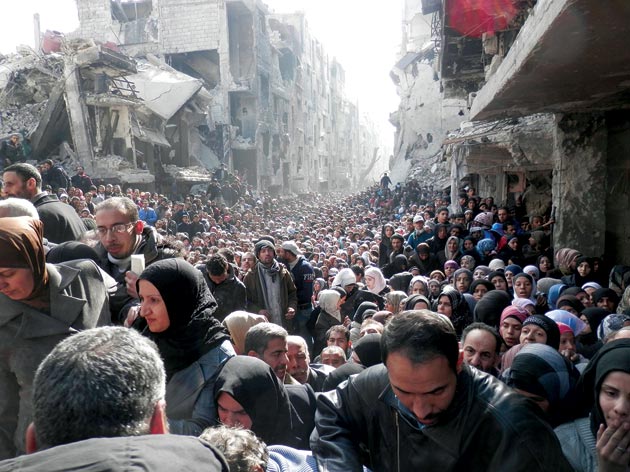
Mazen had spent five years in a political prison for his association with the Communist Workers Party. There, he was introduced to theater. Mazen came to believe that in Syria, the most powerful subversion was in art, not in politics, because art was difficult to suppress. Once, Mazen produced a play based on Kafka’s Metamorphosis, but the censors refused to let him stage it because Kafka was Jewish and they accused Mazen of trying to spread Zionist propaganda. He changed the name of the play to The Cockroach, the censors didn’t notice, and he performed it to a full house 10 nights in a row.
On Thursday nights at Mazen’s, Hassan and Waed would squeeze onto a couch or a spot on the floor. Everyone would watch a film or listen to people read their poetry or see someone’s photo project. They would discuss these works, and Mazen would bring food out—chicken, fries, eggplant with ground beef, hummus, pizza—and people would drink beer and anise-flavored brandy clouded with water. Someone might play flamenco guitar or put Algerian Rai on the stereo, or maybe Manu Chao. Hassan would drag Waed onto the dance floor, and then they would sit out in the courtyard where people talked about literature (was Faulkner better in Arabic than in English?) and politics (if they won the right to return to Palestine, would they actually want to leave Yarmouk?). Then Mazen would throw everyone out and they would walk home. Snippets of songs would trickle from radios into the streets, and sometimes they would see old men shuffling to the mosques for the early morning prayer. It was 2010. The world was safe.
Fall came, then winter. Hassan wrote plays and acted. A man lit himself on fire in Tunisia and there was a revolution. Then there was another in Egypt, and in Yemen, and Bahrain. They watched it all on TV, but the camp rolled on with its usual cadence. They still gathered at Mazen’s. They still talked and sang about returning someday to Palestine. They thought the fever of these revolutions would spread to Syria, and some of it did. Friends of theirs were arrested and released, but Yarmouk stayed the same.
Then, on the internet, some people made a call for Palestinians to have their own Arab Spring uprising. It was 2011, and they were calling it the “third intifada.” People in the West Bank and Gaza would rise against Israel, and the diaspora would storm the borders, unarmed. It would happen on Nakba Day, the day Palestinians commemorate their expulsion. Waed and Hassan were excited about it at first, but then pro-Assad Palestinian parties in Syria got involved and Hassan became suspicious.
Every year, the regime held events in the Syrian-controlled section of the Golan Heights to commemorate the Nakba, but they never let anyone near the border. This time, however, they left the road to the border open. Hundreds of young men rushed the barbed wire fence that separated the two countries. Young men threw rocks. Israeli soldiers fired their rifles. It happened again a few weeks later, on the anniversary of Israel’s seizure of the Golan Heights; 23 of the protesters were killed by Israeli soldiers, around 350 injured.
The dead in their wooden boxes floated over the heads of people filling Yarmouk Street. Hundreds surrounded the headquarters of the pro-regime Palestinian party. Was the regime trying to deflect attention from its own atrocities by trotting these young men off to get killed by Israeli border police? Some threw rocks. A 14-year-old boy was shot dead from the building. The people inside fled, shooting in the air as they left. The crowd stormed the headquarters and lit it on fire. They chanted, “The people want the end of corruption” and “God is great.”
As the months passed, Syria started to slip into war. The military had killed protesters in Dara’a, and by November tanks were opening fire on Homs. Hassan decided he needed to become more active. He wasn’t going to become a fighter, though he sympathized with them. What people needed, he decided, was comedy. Along with a few friends, he started filming skits and posting them to YouTube. Some of them were about the ridiculous details of daily life—people consumed with their smartphones, self-obsessed poets, men who bragged about how many phone numbers they’d scored from women. Other videos brought humor to the experience of war. As the fighting started taking its toll on the communications infrastructure, Hassan did a skit of himself running through the streets like a rebel fighter—to find cell coverage.
Humor was in short supply in Yarmouk. Mazen’s gatherings continued, but the tone had changed. There was no more dancing. Pro-regime Palestinian militiamen stood on corners around the camp. People from other parts of south Damascus, where there was fighting between regime and opposition forces, were flowing in, bloating Yarmouk’s population to as many as 900,000, nearly double its prewar density. At Mazen’s, the group of friends would discuss how to find apartments for these newcomers. How would they get them medicine and food? How would they register their kids in schools? Many of them started smuggling food and medical supplies to nearby neighborhoods coming under siege. Hassan headed a group of activists who documented events and posted their videos to YouTube.
For Waed and Hassan, there was a silver lining to all this chaos. With enforcement of building codes vanishing, they began to transform their little unfinished room into a studio apartment with a tiny bathroom and a kitchenette. Then, in December 2011, they got married.
But things were no longer the same. People began to disappear. One night, regime loyalists showed up at Mazen’s apartment and took one of their friends away. Shells would land in Yarmouk at random times. Mazen and others fled Syria.
On December 16, 2012, Waed was at work, on the other side of Damascus, when Hassan called and told her not to come home. MiG fighter jets had stormed over Yarmouk and launched missiles at several schools in the camp. Seconds later, they hit a hospital. Then the mosque, full of displaced people. Some people from Hassan’s film crew ran to the mosque. Bodies and parts of bodies were everywhere, like a pack of cards thrown up and left to lie as they fell. Men rushed around the place of worship, streaking the puddles of blood on the floor. Children screamed. Some just stared silently.
Waed told Hassan she would stay away, but as soon as she hung up the phone she rushed to Yarmouk. People were filing out of the camp by the thousands, carrying babies or armfuls of luggage. Waed pushed past them. Stay away from Yarmouk Street, they told her. There are snipers. But Yarmouk Street bisected the camp. The only way she could get to Hassan was to cross it.
She found the thoroughfare, always so jammed with cars and smelling of exhaust and pastries, empty. The only humans she could spot were a few men with guns—opposition fighters. She’d never seen any of those in the camp, but now she took a deep breath and ran toward them, shouting, “Long live the Free Syrian Army!” She heard bullets crack up the street and found Hassan standing in front of their house. “What are you doing here?” he exclaimed. His face showed both terror and relief.
The next day, thousands more left Yarmouk, including Waed’s family. Some crammed into relatives’ apartments in other parts of the city. Others slept on the streets. Hassan and Waed wouldn’t go. As the days passed, the shelling got heavier. Stray bullets came through their bathroom wall. One morning, Hassan woke Waed and told her they had to move downstairs into his parents’ apartment, where it was safer. She got up, closed the door, and went back to bed. “If you want to go, go,” she said. “This is my house, and I’m not leaving it.” She wasn’t trying to be a martyr; she just couldn’t let it go. No matter how rational it might have been to move, it was more comforting to close her own door to the world falling apart outside.
The fronts in Syria were hardening. The opposition controlled most of the country’s north, and nearly every major city had rebels battling the regime for control. Religious fundamentalist groups were starting to gain influence in the opposition, and suicide bombings against regime targets were on the rise.
A pro-regime checkpoint went up at the beginning of Yarmouk Street. Waed had to go through it to get to the other side of Damascus, where she worked for a company building a private hospital wing for the Assad family. Every morning, she would steel herself before making the journey. Regime snipers had set up on the rooftops. Several of the main streets of Yarmouk were now closed off like this, and when people had to cross them, they would dash across in a zigzag pattern to make themselves difficult targets.
She walked along the sidewalk, nervous yet determined. She and Hassan needed money to eat and the snipers targeted young men, so there was no way for him to work. Besides, there was almost no food for sale in Yarmouk anymore. The checkpoint blocked flour and gas from getting in. No one was allowed to bring in more than one bag of bread.
Rather than risk the checkpoint and its snipers, or wait for the intermittent UN aid packages, many started breaking into shuttered shops and abandoned houses to find something to eat. Within weeks, the camp’s complicated social hierarchy was obliterated. One neighbor of Waed’s parents, a well-respected historian, was now looting for bags of macaroni with his wife to feed their five-year-old twins. To cook them, Ghassan Shahabi and his family pulled doors and windows from abandoned apartments and lit a fire outside.
Waed and Hassan were fortunate, relatively speaking. Her government-related job allowed her to leave the neighborhood every day and bring back food, and their neighbors had left behind a supply of heating oil. It was colder than usual that winter. One night, it snowed, and people went outside to make snowmen. Ghassan, his wife, Siham, and their children were bundled up in blankets by a fire in the street, a warmer spot than their freezing apartment.
Ghassan and Siham grew hungrier. One day, they decided they couldn’t take it anymore. During the morning window when the checkpoint opened, they put the twins in their car, drove into the city, and bought 25 bags of bread. The next day, on their way back in, a soldier searched the car and found their stash. Only one bag goes in, he told them, and the car has to stay out of the camp. Siham and the kids got out of the car with their one bag, then a soldier called from the other side of the checkpoint.
“Ghassan Shahabi,” he shouted. “Never mind. It’s okay. Go ahead and come in with your car.” Maybe the soldier had seen the kids and had a change of heart? Siham and the girls got in the backseat. Ghassan drove ahead. A sniper bullet pierced the window and went straight into Ghassan’s back, and then the gas tank was hit and erupted in flames. Ghassan’s lifeless foot continued to press the gas pedal. The car drove a ways down Yarmouk Street and crashed into a wall. People rushed to pull the screaming kids out of the car. They buried Ghassan immediately.
In the days that followed, Siham and the children gathered remnants of bread where they could find them and warmed them on the fire. After eight days, she decided, “If we die, we die. It’s better to die by sniper fire than by hunger.” They paid someone to drive them to the entrance of the camp. Snipers shot along the road, and when they got out of the car, they saw a man and a boy lying dead on the street. They ran to the checkpoint and got out. Eventually they found their way to Lebanon.
In Paris, Mazen got a call from a neighbor back in Yarmouk. The other day, in the little alley in front of his apartment, a dog had dragged in and eaten the lower half of a human body. The books on the shelves of Mazen’s apartment were all gone. Presumably people had burned them to keep warm.
By June 2013, people in other parts of Syria were starting to accuse the regime of using chemical weapons. The United States and the United Kingdom were now officially aiding the rebels, and Hezbollah, the Lebanese militia historically funded by Iran and Syria, was fighting on the side of the regime. Only 20,000 people remained in Yarmouk, leaving the streets eerily empty.
One day after midnight, Waed and Hassan heard a man call Hassan’s name. Downstairs was a car with some men from an Islamic opposition group. They told him to get in and drove away.
The men interrogated Hassan. Why had he been filming in a cemetery earlier that week? He explained that he was filming a man whose relative had died. Every single day the man went to his grave and put a flower on it. Hassan wanted to capture that quiet moment. The men asked if he was a spy. Was he filming the area to tell the regime where the militants were located?
Eventually they let him go, but Waed was seething. She and Hassan had been happy when the opposition fighters first showed up—perhaps they would go on to depose Assad. But it had been five months, and now she had to show her ID both at the regime checkpoint and to the Free Syrian Army fighters. Rumors were going around that the FSA was looting houses and stealing the little food aid that was getting in. More and more, bearded men were shouting at her for not wearing a hijab, for not fearing God.
Waed quit her job—the checkpoint was closed too often, and she was worried about being locked outside. It was time to leave, she told Hassan—she had family they could stay with. But now he refused. All those people in the camp, he said, they couldn’t just leave them. He wanted to keep going, to make a film, something.
Then, one day in July, the checkpoint closed permanently. No one could get into Yarmouk, and only the sick, which mostly meant the starving, could leave. Anyone who showed up at the checkpoint with an injury was presumed to be a fighter and likely to be arrested or killed. There was hardly any electricity, sometimes no water. The regime cut off all outside aid. No food was getting in, no medicine. Nothing.
There was a time when this sort of thing was common. The Goths blocked off the main entrances of Rome and cut off its aqueducts in 537, letting disease and famine spread throughout the city for more than a year. It was good to trap civilians inside, because they ate up food that would otherwise sustain the fighters. When the Romans besieged Jerusalem in 70 A.D., they allowed pilgrims to enter, but didn’t let them leave.
In the Middle Ages, sieges were far more common than battles. They became increasingly deadly as urban areas grew. World War II brought what was probably the deadliest siege in history when the Nazis surrounded Leningrad for 872 days. A million people in the city perished.
When the war was over, many thought no one would ever try something so horrific again. Then, in the early 1990s, the Serbian army blockaded Sarajevo, cutting off food, medicine, and electricity for years.
While the Syrian regime made global headlines with its use of chemical weapons, its use of starvation has largely slipped under the radar, even though it is far more pervasive. Assad has been trying to prevent food and medicine from entering opposition-controlled parts of Syria, while also destroying 60 percent of the country’s hospitals. Parts of Homs were cut off from the outside world for three years, and most of southern Damascus came under siege by last year, as did large parts of Aleppo. As this story went to print, some 250,000 people—the population of Orlando, Florida—were living under siege in Syria, completely cut off from outside food or aid. Most of the time regime forces were responsible for the blockades, though opposition forces began using the tactic too.
Overall, the United Nations says 10.8 million people in Syria—half the population—are currently in need of humanitarian assistance. (On November 11, the world body’s refugee agency said it was nearly $60 million short in funding to help nearly a million displaced people in Iraq and Syria get ready for winter.) The World Food Program reports it is delivering aid to 3.7 million, but it’s not clear how much of that is making it to people in need. One UN worker who deals with food distribution in Damascus told me, “We don’t actually know if it ends up in their hands, especially the food that goes to the opposition-held areas. We just don’t know where it ends up.”
By allowing food distribution only in the areas it controls, the regime has become the only source of survival for desperate Syrians; dissidents often face the choice between staying in besieged areas and starving, or crossing to the regime side to be arrested or killed. For most of the conflict, the UN has been largely complicit with this strategy, following its usual mandate to deliver aid only with the permission of the country receiving it. Under international pressure, the world body announced in July that it would start driving some convoys directly into rebel-held territories from neighboring countries. But for places like Yarmouk, with no international borders nearby, it remains virtually impossible to get food in without the regime’s permission.
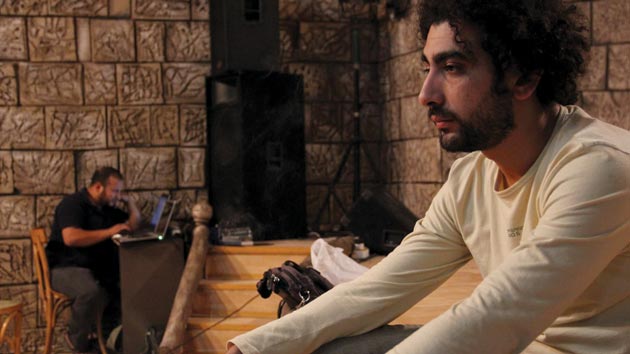
When the siege of Yarmouk began, Hassan was volunteering at a summer camp, teaching theater. The program finished in August, at the end of Ramadan. Normally, the streets would be full of sweets and festivities for Eid, but the mortars made it hard to go out at night. Hassan got some gifts and put on a little party for the theater kids in the basement of a building. After the children went home, the young men and a few women stayed behind, the men singing songs and dancing dabka. Hand in hand, they kicked their feet into the air and stomped on the ground as they snaked around the room. As they danced, three young men came down the stairs. They had beards and long robes and were carrying guns. One approached Waed as she smoked her cigarette near the entrance.
“Is this the image of a Muslim woman?” he asked her in formal Arabic.
“I’m not a Muslim,” she spat back, lying.
The three stormed into the room where the men were dancing. “What did I walk into here, some kind of brothel?” the man shouted.
“Whoa,” Hassan said. “This is my wife here. What’s the problem?” Waed recognized the bearded man. He was from the camp too, and he knew they were dancing a traditional Palestinian dance. It was Eid. This was what people did.
The man grabbed Hassan and put his gun to his head and shouted, “I will kill you today! If you want to fuck your woman with all of your friends, do it in private. Not in a public place.”
That night, Waed told Hassan they had to leave. They weren’t going to make any difference by staying in Yarmouk—the only question was whether they would die there, or survive somewhere else. Hassan agreed to find a way out. He just needed to film a little more. That way, at least, he could take something out with him, to show people what was going on inside the black hole they lived in.
Days passed, then weeks. Hassan and Waed were mostly living off ground-up macaroni and lentils that she made into something like bread. People with babies were on the streets, begging for something, anything, to eat. Waed barely went outside anymore because people kept harassing her for not wearing a hijab.
Shelling had turned the upper half of Yarmouk Street into an apocalyptic hellÂscape. The buildings on each side of the street crumbled and sloped like the walls of a craggy ravine. By now, many different groups in Yarmouk were fighting the regime. Even Hamas had joined in. The rebels had transformed apartment buildings into warrens, smashing holes through the walls so they could move around without setting foot on the street.
A friend of Waed and Hassan’s put his own obituary in a newspaper. He had defected from the military and in retaliation his brother had been arrested. The friend figured if the regime was convinced of his death, they’d let his brother go. He put up posters around the camp extolling himself as a martyr and had friends post mournful reminiscences of him on Facebook. He erected a gravestone with his name on it.
Waed and Hassan heard of a way out. They could go south through Hajr al-Aswad and Sbeneh, two other districts that were also under siege. In Sbeneh, there was a checkpoint that was still open, the last one in all of besieged south Damascus. Waed’s father knew the officer who ran it.
In October 2013, they gathered up what they could and got in a car, which drove them as far as they could go before entering sniper range. They walked for another hour and a half to the checkpoint in Sbeneh. There were around 300 people lined up under the desert-hot sun. They gave their IDs to an officer, who went off into a building. As they waited for him, a woman approached. She was dressed like a member of Al Shabiha, Assad’s anti-dissident militia. She eyed Hassan. “I don’t like your look,” she said. “What were you doing in the camp?” Waed started to respond. “No one told you to speak,” the woman snapped. Hassan pinched Waed in the side, and she bit her tongue until the woman left. They plopped down on the ground. “Forget about it,” Hassan said, and then he smiled. “I think she’s just jealous of you.” She looked up at him and they laughed.
Two minutes later, an officer called Hassan into a building. An hour and a half passed. Waed grew worried. Their family, waiting on the other side of the checkpoint, kept calling her to ask what was going on. It was growing dark. Then a soldier called her inside. Hassan wasn’t there. She gathered her courage and asked, “Where is Hassan?”
“Who is Hassan?” the officer replied.
“My husband. You brought him in here a little while ago.”
The officer explained that Hassan was wanted. They would run her ID as well and if there wasn’t a warrant out for her, she would be sent back to Yarmouk. Her head spun. Back to the camp? It’s dark outside. There are FSA checkpoints. They’ll know I was entering from the regime checkpoint. They might kill me.
The officer raised his eyebrows and said softly, “If you want, why don’t you sleep here with us?”
She noticed that the window in his office looked out over the line of people waiting. She imagined this same scenario playing out every evening—him gazing out the window, finding a woman he liked, calling her to his office.
The officer pointed to the laptop she was gripping and told her to open it. It was Hassan’s. There were video files on the desktop, and the officer started clicking on them. Footage from Hassan’s grandmother’s apartment, then a video of a soldier lying with his eyes closed. Hassan’s voice came in, saying, “God is great. A martyr from Dara’a!” He laughed, and Waed grew more nervous. She knew the video. It was a prank he’d pulled on a sleeping friend back in the military, before the revolution, but the officer looked suspicious.
Then he opened Hassan’s last satire video. Unlike his other work, this one dealt directly with the siege. Still, Hassan had apparently thought it innocuous enough to leave on his laptop. It was comedy. None of it called out the regime directly. He had plenty of damning footage, but that was on an encrypted hard drive. Not even Waed knew the password.
The officer played the video. One character after another painted a little offbeat picture of life in the camp. Electricians, rebels, worried relatives of people stuck inside: All of them were Hassan in various costumes. The officer watched Hassan dressed as an Islamist threateningly asking directions from Hassan dressed as himself. The Islamist was shouting in formal Arabic, and Hassan asked him, “You really came here all by yourself? You don’t have a map? Google Earth?” The officer laughed. Another skit came on, of Hassan dressed as a raggedy man at the checkpoint in Yarmouk, telling a soldier it was the regime that brought the opposition fighters into the camp, so as to destroy it. It was a joke about conspiracy theorists in the camp, but the officer didn’t find it funny.
Waed convinced the officer to let her call her family. Finally, after she arranged a bribe, he let her go. He kept the laptop.
Waed’s mother knew a woman who worked in the government. The woman told her Hassan was charged with “insulting the government in the media.” For three months their families made phone calls and paid bribes. Finally, a man who’d been stringing them along for more money grew tired of their pestering. He told them about an office that kept a database of prisoners.
Hassan’s father called that office. “Your son passed away on October 23″—just a few days after that night at the checkpoint—he was told. “You can come tomorrow to collect his ID and then go to the military hospital and get a death certificate.” Hassan’s father went. He asked for the body, and an officer raised the butt of his rifle: “You don’t have the right to ask such questions. Take his ID and get out of here. This will be better for you.”
After she heard what happened, Waed felt a darkness pressing down on her. “It’s like a dream. The whole time I was searching for him and in the end they just said, ‘That’s it, he’s gone.’ Where is he? ‘You can’t know. That’s it. That’s it.'”
In January 2014, Waed left Syria. She went to Beirut, a city where people were out every night in streets packed with clubs, where there were trendy neighborhoods with vegan cupcakes, where women walked around with bandages on their faces from brand new nose jobs and men drove their Hummers to private beaches. One neighborhood had a banner saying Syrians must be off the streets by 8 p.m. Bombings in the city were becoming more frequent and the news blamed Syrians and Palestinians.
Things were different than in Yarmouk. People drank more and the conversations were darker. At one gathering, a man talked about how, before leaving Syria, he was picked up at a protest and shoved into the trunk of a car with four other men, beaten, and released the next day after being made to kiss the shoes of a general, but that wasn’t as bad as when his mother was arrested and held for a week and the intelligence agent would call him at night and claim he was raping her while she screamed in the background.
A week after Waed arrived in Lebanon, her visa expired and the Lebanese government wasn’t renewing Palestinian visas. The United Nations wouldn’t help them find anywhere to go either. The international organization had a program for resettling Syrian refugees, but Syrian Palestinians didn’t qualify. The UN, like Arab governments, held that resettling them in other countries would be absolving Israel of its responsibility to deal with its Palestinian refugees.
Even regular Syrians didn’t have many options. The scale of displacement in the country dwarfs any conflict in recent memory. Nine and a half million Syrians—nearly half of the population—have had to leave their homes, and 3 million of them have fled the country. At the height of the Bosnian war, 2.6 million fled their homes. In Iraq, the highest figure was 4.7 million.
As of December 2013, only 5,600 Syrians had been resettled in third countries by the UN refugee agency. This year, Germany committed to take in 25,500 refugees. Sweden has agreed to resettle 1,200. The United States has taken a mere 156 Syrian refugees, and according to a State Department spokesman, the majority of them applied before the crisis.
Part of the reason is US anti-terrorism laws: The Department of Homeland Security considers every armed group in Syria to be a terrorist organization, including those materially supported by the US government. Verbally endorsing any armed group in Syria can cause someone to be barred from entering the United States—a standard that, if applied to most members of Congress, would disqualify them. Earlier this year, the law was changed so as not to bar anyone who “has not provided more than an insignificant amount of material support to a terrorist organization.” But even so, DHS’s website says it considers “providing food, helping to set up tents, distributing literature, or making a small monetary contribution” to be grounds for disqualification. (DHS did not respond to my requests for comment, except to email general statements about its policy of “constantly reviewing” the criteria.)
Some of the people around Waed, including Hassan’s mother, began talking about desperate options, like trying to get to Europe by boat. But the vessels were prone to sinking or, if they left from Egypt, getting shot at by coast guards. And smugglers’ fees could easily reach $10,000.
Waed applied for asylum at the French Embassy. She explained that she was secular, and that her husband was most likely tortured to death by the regime.
Months passed as she waited, and she started to come out of her shell. She went out and visited people. She laughed. In June, she learned that she had been granted asylum. Her friends got together on her balcony to celebrate. “Maybe I should try to go to Turkey,” her friend Samir said. “Does anyone know someone who could give me an invitation?” He took a drag from his cigarette. “Maybe I’ll go to Ecuador. I hear Palestinians don’t need a visa to go there. Or maybe Indonesia—”
In the distance, a flash. Sparks emanated outward from the ground like a massive firework. Was it related to the World Cup? A red, fiery core grew and floated upward. It grew into a mushroom, and then they heard the BOOM! The flame expanded, then dissipated into the darkness.
Everyone’s faces were ashen. They moved inside. Finally, Waed smiled. “I’m used to this,” she said.
She still didn’t know how to feel about leaving. She had successfully convinced a bureaucrat that her life was more at risk than those of millions of others. She would be farther from Yarmouk and the war and the memory of crossing that checkpoint without Hassan. But she would also be farther from these nights with people who knew and loved her. Who, in France, would be heartened by the fact that some of her friends still in Yarmouk had planted seeds and were now reaping their first harvest of vegetables? Who would care that UN aid packages were occasionally getting in, but that people were saying the regime was using them as bait to arrest young men desperate for food? Or that some shops were open now, but at $20 a cigarette and $65 for bread, all it meant for regular people was that they could watch warlords smoke and eat? She would be on streets where people didn’t know that a place that was being rubbed out of existence ever did exist.
Samir poured himself a second araq. Someone else lit a spliff. Some searched Twitter and Facebook. The explosion was caused by a suicide bomber. After a while, everyone moved back out onto the terrace. Samir talked more about crazy schemes for leaving, and everyone glanced periodically at the red glow in the distance. The fire burned low, then it disappeared.


